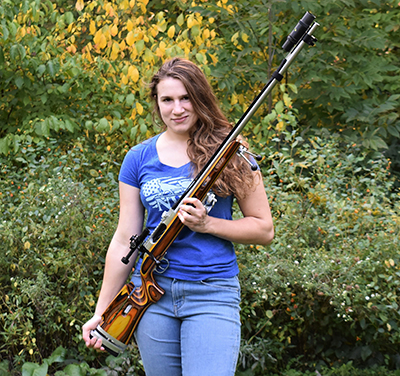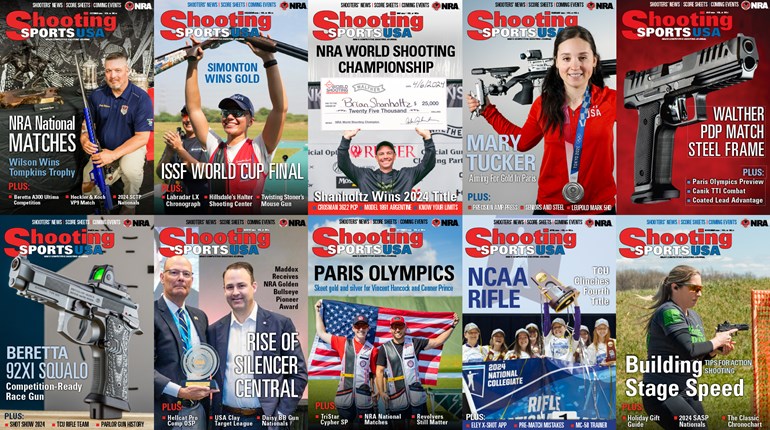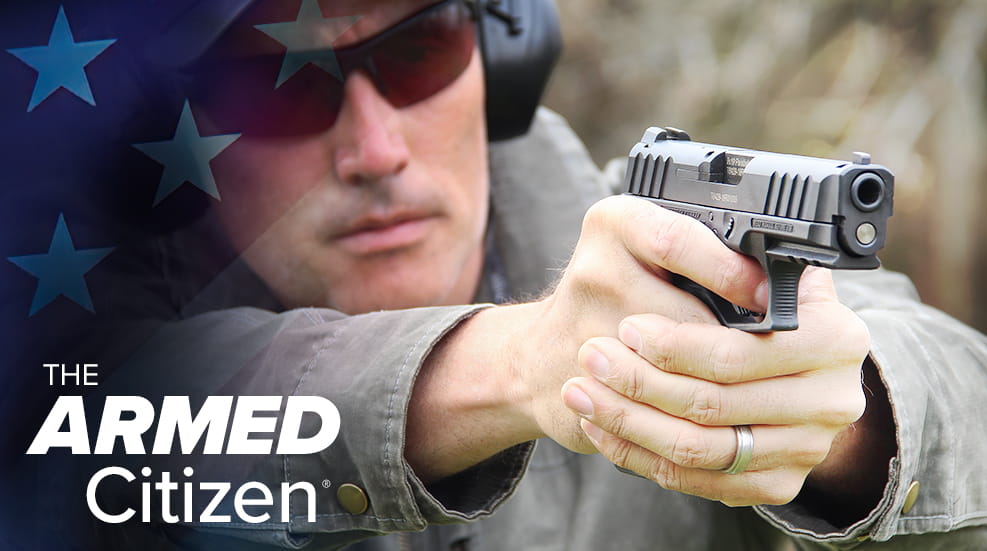
Meet Becky and Mark Yackley with their sons Tim, Sean and Andrew. They travel and compete as a family. In 2016, Becky also started a camp for kids called 2A Heritage.
It’s when they look back that experienced gun owners realize their view of guns, and of our Second Amendment, has been molded on the range. Realizing this then makes it clearer that the next generation must also be introduced to this freedom, and thereby molded by honest, real experiences—not the mainstream media’s spin.
Many are now getting this opportunity. During this past year, millions of Americans bought their first gun and so have taken their first steps into understanding this hands-on freedom. With good instruction, trepidation soon becomes confidence, and uncertainty gives way to enjoyment.
This transformation is especially evident in the young.
When Benjamin D’Angelo decided on a whim four years ago to join his church group for his first-ever trip to a gun range, he didn’t anticipate how it would change his life.

“I like problem-solving and thinking outside the box,” said the 18-year-old competitive shooter, who balances his time on the range with his aerospace engineering studies at the University of Akron, located in Ohio. “My main goal in life is to always learn from whatever happens.”
Today, D’Angelo is one of the country’s rising stars in smallbore rifle, air rifle and service rifle competitions. He also recently entered precision rifle series matches. He has already competed at both the state and the national level, and was a first-round invite to the Junior Olympic Championships this year, which was postponed due to the coronavirus pandemic.
Nonetheless, he is still honing his skills and spreading the word.
“I love talking to people about the sport and helping to educate newcomers and encourage them,” D’Angelo said.
And he is embracing the notion that practice makes perfect. During the pandemic, he kept training three days a week at his home club in western New York, and purchased a computer-controlled rifle-training system, which has allowed him to continue practicing and even to compete in online matches.
“One of the most-challenging things about being at a competitive level would have to be the modern, all-around practice techniques that lead to match-day consistency. I always make sure that when I am practicing, I try to keep the same mental attitude as if I were shooting a big match,” said D’Angelo. “I also want to be consistent with my diet before a match. I typically wouldn’t want to be shooting a match after a large meal, so I make sure that I don’t before I go to practice.”
D’Angelo is one of many hundreds of thousands of American youth who have embraced bearing arms. To scores of Millennials and the upcoming Generation Z, shooting is a way to find both community and alone time. To some, shooting has become a hobby. To others, it has become a way of life, and competitions are a natural extension of taking the passion to the next level.
“I would not name one competition as outstanding, but look instead at the journey,” said Serena Juchnowski, a 21-year-old native of Richmond, Ohio. “My greatest accomplishment in the shooting world was earning my Distinguished Rifleman’s Badge in 2019. It is the highest honor recognized by the U.S. government for marksmanship.”

That journey started in 2015 when she earned her first four excellence-in-competition points toward the badge, and ended 2019 with a total of 34 points, out of 30 needed.
“I set this goal for myself when I first started high-power [rifle],” she said. “I am proud to have earned all the points in Ohio, my home state, and to have earned the badge before I turned 21.”
The infectiously passionate Juchnowski acquired her first taste for the sport when she and her sister were part of a local program designed to strengthen father-daughter relationships through outdoor activities.
“My dad has been an avid outdoorsman since he was young, so my sister and I were taught firearm safety at an early age,” she said. “When I was seven, my parents bought my sister and I our own B.B. guns. I took more of an interest than my sister, but still hardly touched it because it was too difficult for me to pump. I did not pick up what I consider my first firearm until 2013, when I was in eighth grade.”
That was an Uberti .22 rifle. Juchnowski knocked down the chicken silhouette with her first trigger pull and then joined the Tusco Rifle Club. She earned a spot on the South Cuyahoga Sportsmen’s Association’s Junior High-Power Rifle Team two years later.
“At Tusco, I met the first members of what I call my ‘range family.’ Even though I was often the only girl on the range, I felt at home and welcomed, much more so than I had felt when I played softball and soccer in elementary and middle school,” Juchnowski said. “This sense of belonging and support has had a huge impact on me as a person and is one of the reasons I am so passionate about competitive shooting.”
As a high-power service rifle competitor, she shoots AR-15 at 200 yards, 300 yards and 600 yards from the standing, sitting and prone positions. This year, Juchnowski added shooting long-range with a Palma rifle out to 1,000 yards with iron sights to her repertoire. Shooting is simply a way of life for the young marketing graduate—she volunteers as Ohio’s junior high-power program director to introduce youth to the sport and she volunteers as secretary of Sycamore Hill Rifle Club.
“One thing I have noticed is because I am female, more people in the educational environment are willing to accept me. I am seen as a barrier breaker; as a woman in what has long been considered a man’s sport,” said Juchnowski.
For young competitors like Brady Fowkes, a 16-year-old hailing from Clarion, Penn., it’s all about the challenge.
“I began shooting rifles, such as .22s, around the age of five, for the purpose of learning gun safety and hunting, and I started shooting in competitions after shooting with the 4H program and attending the Camp Perry National Matches Smallbore camp,” he said. “I now shoot indoor and outdoor precision Smallbore 3p matches as well as Indoor precision air-rifle competitions. One of my greatest achievements has been winning the state title for outdoor 3p Smallbore two years in a row.”
Living in a rural pocket of the country, Fowkes emphasized that his community, teachers and peers are incredibly supportive of his sport and accomplishments, but such rewards don’t come without some sacrifices.
“The most challenging part about shooting at a competitive level is the amount of time and effort that goes into it, whether it be the time spent traveling from match to match or the training that goes on weekly with the team,” he said. “I train twice a week at one of our local sportsman’s clubs with the rest of my teammates. I occasionally train at home and attend training clinics when possible.”
The next goal for Fowkes is to join a college rifle team and ultimately advance to shooting on the Army Marksmanship Unit team.
Of course, shooting competitions are about as old as human civilization—from Ancient Greece to the first modern Olympics in 1896 to the first-ever World Shooting Championships in Lyon, France a year later, people have attempted to test themselves in competition. In today’s America, there are a lot of options youth can adopt. There are action-shooting disciplines, including USPSA, IPSC and 3 Gun; then, there is a trove of other styles that center on breath control and finely tuned motor skills, such as the long-range rifle, precision pistol and smallbore rifle.
The benefits, both physically and mentally, include strength, endurance, awareness, control, responsibility, stress management, maturity, patience, working through feelings of failure and disappointment, and teamwork—all of which build character, and hopefully, self-confidence and empowerment. Training for, and shooting in, competitions also fosters a real understanding of the nature and practicality of our Second Amendment freedoms.
“I first learned to shoot when I was 21 years old. After graduating with my B.A., I got a job as a news reporter in Tennessee, where I didn’t know anyone. This would be the first time I would move away and not know a soul, so I decided, as a single female living on my own, I needed protection. My mother and I went to a local gun store, and I bought my first gun, a 9 mm S&W M&P Shield,” said Holly Hoechstenbach, 30, who is now known in the competition community by her social-media nickname, “Definitely Holly.” “I took my concealed-carry class and spent a lot of time practicing. My training would only continue to grow.”
A devoted gun-rights advocate, Hoechstenbach competed for the first time last summer, donning a 9 mm S&W M&P Shield at a USPSA competition at the Benchrest Rifle Club of St. Louis.
“My greatest achievement with shooting in competitions has been the fact that I completed it. I now know I can do it, which gave me extra confidence and a sense of accomplishment,” she said. “The most-challenging thing in competition shooting is always comparing yourself to others, and also being slightly intimidated, although I quickly got over it and realized, wow, I can actually do this! I began to focus on my own growth and continual learning instead of comparing myself to others.”

Meanwhile, Mackenzie Van Patten, a 20-year-old collegiate-level shooter from Nampa, Idaho, got into firearms instead of dolls when she was a child, after her father exposed her to the shooting sports.
“Initially, my favorite competition was when we shot at Murray State University during my freshman year of college; my standing smallbore was not going well, to say the least, so I mentally gathered myself and ended up shooting a perfect 100 on the last 10 shots,” she said. “Needless to say, I came off the line smiling and received multiple compliments on my comeback; however, the best matches are not salvaged at the last minute, but rather, are won by being consistent all the way through.”
Competitions may seem, on the outset, intimidating to youth and reserved “only for the professionals.” Yet that’s missing the point. Ultimately, it isn’t about the trophy. It is about putting one’s skills to the test with grace under pressure; after all, none of us ever know when that unnerving moment of having to defend ourselves could arise.
While each of these young rising stars has their own reasons for taking up arms and taking their love to the next level in a competitive setting, there is a common thread. Each is well-versed in what it means to be an American, what it means to have the Second Amendment and what it means to personify liberty.
“Individual freedom is very important to me,” Juchnowski said. “I am proud to live in America, and it is the greatest country on earth. It is difficult to say just one thing about the Second Amendment, as it does so much. It protects all of our other rights. It gives people a way to defend and feed themselves and their families.”
Fowkes concurred that individual freedom is one of the “absolute most-important things in life.”

“As an American, there is no better feeling than waking up and knowing that I don’t have to bow down to an oppressive government because our Founding Fathers fought for that right. I believe the Second Amendment is one of our most-valuable and important rights as U.S. citizens,” he said. “The Second Amendment protects us from an overpowering government, and without it, we would be at the mercy of politicians and tyrants. In my opinion, the Second Amendment is the absolute pinnacle of our rights as free Americans.” (For more on the shooting sports, go to ssusa.org.)

Kim Rhode and her dad, Richard Rhode
By Barbara Baird
Kim Rhode, a six-time Olympic medalist in the shotgun sports, grew up competing, and even lettered four years on her California high school’s shooting team. Kim, along with her dad and coach, Richard Rhode, are some of the best go-to folks in the shooting world to talk about the importance of training kids to shoot and learn about the Second Amendment. On the day of this interview, they were going home after a day of training.
Kim has worked with several youth organizations, including Scholastic Clay Target Program (SCTP), 4-H and High School Clay Target Leagues. She also serves as the Chairman of the International Shooting Sports Federation’s (ISSF) Athletes Committee, which represents competitive shooters around the world. She is also on the board of the NRA and has been active in President Donald J. Trump’s campaigns.
“After London, at the Olympics,” she said, “I’d just won an Olympic medal, and the first question I got asked by the press was to comment on Aurora (Colorado school shooting). It was at that moment I realized we have a tough road ahead of us, and we need to speak out and become more political, because if we didn’t … this is what the future held for us.”
Throughout the years, Kim has been heartened to see many in the outdoor industry speaking out for the shooting sports. “Reaching out to youth and to women has been a huge thing in our industry, and has grown so that we now have companies geared toward women and children. I see the transition that it’s made in educating people, especially women, because then, you grab the whole family and introduce them to the outdoors. These families, even if they’ve gone out and shot just one time, they will remember that when they go out to vote.”
Kim believes that one of the biggest issues that the shooting sports faces is the lack of knowledge. “The left will prey upon people’s lack of knowledge about guns and ammunition and what we do,” she said. “We need to be more vocal and to educate more people, and to help the young shooters coming up so that we ensure that the sport will be around for generations.”
Kim and her dad are optimistic to see the increase in the number of youth shooting competitively. “It’s unbelievable to look at the hundreds of thousands of kids competing in the clay target programs,” said Richard.
“I look at high-school clay-target leagues and SCTP, where kids are shooting and learning teamwork, education, safety and responsibilities,” said Kim, “but at the same time, they’re learning about their Second Amendment rights. It is making a difference.… Those kids will remember learning the sport when it comes time to vote. It may not be this generation, but the third generation from now, where we impact it and people will be more educated about bills and propositions that people are being asked to vote on.”
Throughout her successful career, Kim has competed around the world and pointed out how traveling educates young shooters, too. “Competitions also educate you on how fortunate you are to have the rights that we do in the United States, especially when you’re going to other countries, such as China, where you’re not allowed to own a firearm unless you’re in the military or a police officer.”
As native Californians who don’t want to throw in the towel and move elsewhere, the Rhode family is going to stay and fight. “The U.S. was founded on the history of the Second Amendment rights. They go generational. I have guns from my grandfather that were his grandfather’s,” said Kim.
 Dakota Overland
Dakota Overland
Another rising star in competition shooting is Dakota Overland. She captured the 2020 USPSA Multigun Ladies National Championship last summer, outmaneuvering and outgunning 17 female competitors in 12 stages. The 17-year-old college student hails from Minnesota and travels the country competing. When she’s not competing, she might be found working as a Second Amendment advocate in the D.C. Project, a non-partisan organization that brings women—at least one from each state—to Washington, D.C., to meet their legislators and discuss the importance of the Second Amendment.
“Diana Muller introduced me to the D.C. Project. She’s been a mentor of mine since I started competing, and when I heard that she needed a Minnesota representative, I was excited to fill the part,” said Dakota.
Unfortunately, Dakota believes her generation is disconnected from the Second Amendment. “With a lot of the amazing opportunities, my generation has looked away from this fundamental means of protection, and has become too comfortable with being uneducated on things they fear due to lack of understanding.
“I’ll always have a drive to continue Second Amendment advocacy. I plan to continue talking to my representatives and educating people, particularly in my generation, on the importance of the Second Amendment.”
When asked about Dakota, Diana Muller, founder of the DC Project, said, “She is at the top of the 3-Gun game and has stood on the international podium winning bronze at the World Shotgun Championship in France in 2018. She is incredible.”
 Telford Scott
Telford Scott
There aren’t a lot of dads who build their kids a range. But Telford Scott, who lives in West Virginia, built a trap and skeet range on his property and opened the doors to the local community’s kids to form a sanctioned Scholastic Clay Target Program team, the West Virginia Clay Crushers. Here’s why he did it.
“My daughter Makayla was struggling to find a place to practice. We lost the only place she could practice and we would have to travel two hours to get to a field.” Telford said that, at first, he found a hand-me-down trap machine and made it work. “We started thinking, could we do more?” Sponsors, such as MEC, CZ-USA and Lynch Construction stepped in, and the Clay Crushers soon had a new skeet field.
“I always had a love for hunting, but until Makayla, I never realized what opportunities there are in the shooting sports and how they can change someone’s life.” Telford’s family adopted Makayla a few years ago, when Makayla was nine and wouldn’t speak to adults because of a lack of confidence. She tried the ball sports and didn’t like them. Then, she busted a clay, and her world changed.
In fact, Makayla, along with three other teens from across the nation, qualified during the summer of 2019 at one of two major youth competitive shotgun events—the SCTP nationals and the ATA’s AIM championships—to be on the team that would eventually break a world record. The teens joined CZ’s program manager and pro-shooter, Dave Miller, last fall in Kansas to attempt to break the world record of most clays shot by a five-person team in 12 hours. Early in the day, the team shattered the record of 4,602 clays and set a new record with 14,176. Telford stood nearby all day long, beaming with pride at his daughter’s tenacity and prowess.
When asked about the local team, Telford said, “When we started, we were hoping to get six to eight kids, and we got more than 20 the first year. Six of those kids went to the nationals and four of them had never competed at an event like the Nationals. They brought home four medals.”
Telford believes that kids who learn to shoot also learn how to safely handle guns, get exposed to the ideas of competition and hunting or “they may just get outside and learn how to meet people.”
When asked about competitions, he said, “Now, if I take my kids to a shoot [he now has 9-, 12- and 16-year-old children, along with Makayla, who is 17], I don’t worry about them. If we go to the Nationals where there are at least 3,000 kids, and maybe 7,000 adults, it seems like the parents are interested in helping another kid and not about whether their kid can beat yours!”

Becky Yackley
Becky and Mark Yackley have three sons: Tim (22), Sean (20) and Andrew (16). The family is well-known in the world of competition shooting, and sometimes, the whole family might be competing at the same match. Sponsored by top-notch businesses in the firearms industry, the Yackleys travel the country and world to compete. Mark, a Marine Corps officer and Wisconsin State Trooper, joins the family whenever possible in this unusual and exciting lifestyle.
In 2016, Becky started a camp for kids called 2A Heritage, a 501(c)(3) nonprofit group that uses volunteers to teach youth about the shooting sports. The camp evolved from the concept that Becky saw at MGM pistol camps for youth. She wanted to see a 3-Gun camp for kids. “We wanted to continue the ethos that Rhonda Gibson [founder of the original MGM Junior Camps] began. And so, right now, many of our instructors are former participants in the camps, as well as adults who compete professionally, depending on where we have the camp.” Camps have been held at five regions in the eastern half of the U.S. Capped at 25 participants, the three-day camps have seen hundreds of participants.
“Another change since forming 2A Heritage is how we admit campers,” says Becky. “Many avenues for youth to compete require that they have specific prerequisites. We wanted to make the 2A Heritage Camp accessible for brand-new shooters. We get kids who compete in steel challenge, SCTP or action shooting and more. So we’d like them to have some sort of general experience with handling firearms safely; we just don’t have any set prerequisite. We handle a lot on a case-by-case basis. We aren’t a place for someone who has never handled a firearm, but we will help them understand and safely begin competition.” The camp offers loaner gear for attendees.
As for creating Second Amendment advocates, Becky said, “Many of the kids that have been to our camps are active not only in competition, but also in Second Amendment advocacy as well. Competition attracts certain personality traits, in our experience: personalities that ask questions, are proactive, self-sufficient and are willing to work for something they believe in.
“Too many times, sports and training gets clique-y (I’m better than X. My classification is X.) That is something we always strive to keep from our camps,” says Becky. “The newest kids should be as welcomed as the most experienced. We encourage kids and families to help each other, but also not to expect someone to do it all for them.”
At camp, youth get exposed to the Second Amendment through discussions. “One item we always discuss at our camps is how to be a positive influence with respect to the Second Amendment,” noted Becky. “The shooting sports are not about attracting attention for yourself; they are about sharing the Second Amendment and freedoms we hold dear.”
 Makayla Scott
Makayla Scott
Makayla Scott started shooting after she was adopted at nine years old. Before then, she’d endured abuse in the foster care system. Her adopted older brother took her to a 4-H event to learn to shoot. When she broke her first clay, she was all in. Before long, she became an accomplished competitor. She qualified for the Junior Olympics competition in Colorado Springs, Colo., and shot there with the best. She is still growing and learning.
When asked about how her generation feels about the Second Amendment, Makayla said, “I feel like they are aware, but some do take this freedom for granted. Many don’t really know why we have that freedom. But I feel like we could definitely explain that the Second Amendment was written by our forefathers to give us the freedom to protect ourselves. Knowing this stuff makes you feel even more responsibility for the firearm in your hands.”


































